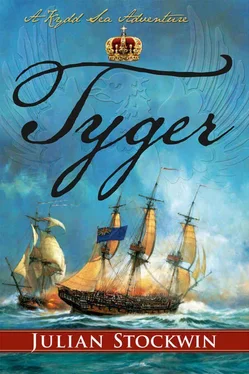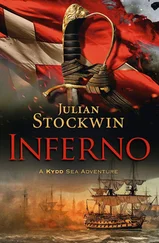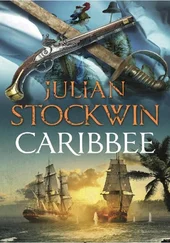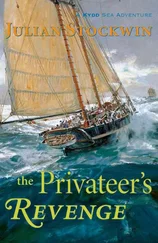In the next few days Kydd was transformed.
He stood in front of a mirror in admiration. Over a cream waistcoat he wore a double-breasted dark green tailcoat, relieved by two discreet lines of brass buttons. Its high collar felt awkward but it served its purpose in confining a gushing white cravat, starched and finished with the looser but fashionable mailcoach knot. The tight-fitting pantaloons were tucked into gleaming hessian boots, sporting tassels and ending with beautifully shaped pointed toes.
In his hand was his latest purchase, a narrow-brimmed hat, flat on the crown and all of twelve inches high but with a wicked curve to the edge. It felt so impractical compared to his service bicorne, which could be folded flat in an instant and tucked under the arm in confined spaces ’tween-decks. He hesitated to put it on, especially as he’d paid a barber an extortionate sum to style his hair in the latest mode, the Titus, shorn everywhere but the front where his dark curls were swept forward in imitation of classical statues of a Roman emperor.
“Bang up t’ the mark,” Bazely enthused from behind. “As will f’r a surety have the ladies all of a tizz, you devil!”
A visit to the glover followed. Kydd blinked at the mounting cost but, then, if he was to be taken for a gentleman about town, why hold back?
It was a gratifying experience to promenade in Hyde Park in the bright summer sunshine, swinging his cane, noticed with a tip of the hat by gentlemen of consequence-he raised his own to passing ladies to their barely concealed delight.
A parade of soldiers, regimental band thumping away, marched past; Kydd and Bazely respectfully stood still with doffed hats as they passed and were awarded a smart salute from the young subaltern in command.
Spotting Kydd, a curious Curzon and his lady hurried over to pay their respects. Too well-bred to remark his astonishment at the vision, he made much of introducing his companion to the famous frigate captain and, in return, Kydd was gracious and fulsome. Finding his old lieutenant still without a ship, he extended an invitation for the pair to accompany himself and Bazely to the theatre the following evening.
Kydd had mentioned that he’d heard the legendary Sarah Siddons had expressed a desire to leave the stage: he would be mortified, he’d said, to miss her performing. The obliging Bazely had made the necessary arrangements, even down to the provision of a pair of pretty sisters, awed to be seen out in such company. And he’d managed to secure extra tickets for Kydd’s guests.
The great actress did not disappoint. Covent Garden was packed for her Isabella, or, The Fatal Marriage and from their box Kydd delightedly took in the sweeping grandeur of her gestures, the agony of her portrayal of the torn woman-and lustily joined in the storm of applause that followed.
At the supper afterwards he was at a loss to remember when he had been last so contented with life.
At breakfast Tysoe appeared with a silver tray. “For you, Sir Thomas.”
It was a personal card with a folded sheet of paper. He recognised the name instantly: Essington, rear admiral, his former second lieutenant’s uncle. Many years before he had put Kydd forward as acting lieutenant, starting him on the journey that had led to where he was today.
The note was short and to the point.
My dear Kydd, or should I say, Sir Thomas. On seeing you at the theatre last night I conceived it my duty and pleasure to invite you to an evening with my friends in retirement, some of whom I’m sure are old acquaintances of yours. Should you feel able to attend, then shall we say tomorrow eve at seven at my club, Brooks’s?
Kydd was delighted. If Essington thought it proper to esteem him as a guest at the distinguished Brooks’s Club, he was most definitely on the rise in society. Not only had it been many years since they had met but Kydd had a soft spot for Bowden, Essington’s nephew, a clear-thinking and resolute young man. With a twinge he reflected that, now unemployed as a lieutenant, Bowden was at that moment probably at the Admiralty begging for a ship. But that was the way of the navy.
He took especial care with his dress, Tysoe fussing with the fall of his cravat, the lie of the satin knee breeches against white stockings and the correct ribbon ties on his silver-buckled black shoes.
Later, with a surge of nervousness, Kydd stepped out of the carriage and looked up at the frowning Palladian facade of the club in St James’s Street. An expressionless doorman took his hat and cane and led him through to the Small Drawing Room.
Half a dozen gentlemen sat comfortably, some alone with newspapers, others together in conversation, and he saw that almost to a man they were in blue, the coats cut severely, with plainly wound neckcloths and close-cut hair. However, the man who rose to greet him wore a white cravat, his hair tied back with a ribbon in the old way.
It was Essington. “So pleased you could come, old fellow,” he said, with a warm smile. “You’ll take a glass of something?”
One or two looked up curiously.
“Kind in you to invite me, sir,” Kydd said politely. “After so long out of hail.”
“Ah-that’s because you’ve been away at your adventures. You’re much talked of, Kydd, you know.”
“I’ve been lucky, sir, this I’ll admit right readily.”
“And you’ll oblige us at supper with an account of each and every one.”
He raised his glass to Kydd, then turned to one of those sitting.
“Reginald, you’d like to meet Captain Kydd of Curacao, at all?”
The man nodded pleasantly.
“This is Admiral Gardner from the San Nicholas Mole affair, old chap.”
Kydd shook hands, aware of a keen look of appraisal. He recalled hearing of the engagement as a young quartermaster.
Then it was Wilkinstone, lamed at the Glorious First of June but who had gone on to command a frigate in a bruising fight in Quiberon Bay, and others, some of whom he remembered from his days as a common sailor when he had seen them as god-like figures on their quarterdecks. To be among their number as a guest now gave him a rush of pleasure.
One stood up to ask him about the taking of Cape Town and soon more came over to listen until Kydd found himself in the middle of an animated throng. He kept his accounts guarded and modest-for all that this was a social occasion, there were at least two serving admirals present.
They were interrupted by the call to supper and sat down with other club members for the informal repast.
Kydd introduced himself to one opposite, a gentleman of years with a shock of white hair, who turned out to be a banker from the City, interested in his observations on trade prospects with South America. On his right, a younger man with a world-weary look was the Member of Parliament for Weymouth; he slumped back cynically as Kydd finished his story of a naval engagement up an East African river among lions and crocodiles.
Past Essington on his left, at the head of the table, there was an empty chair which no one seemed inclined to inhabit. Shortly, the conversations died away as a stooped, elderly man with fierce eyes shuffled painfully in to assume the seat.
With a shock Kydd recognised him: John Jervis, 1st Earl of St Vincent-and first lord of the Admiralty at a crucial time for both Kydd and England. In command of a man-o’-war since the long-ago victory at Quebec, a queller of mutinies, the unflinching enemy of corruption and legendary commander-in-chief of the Channel Fleet, he had only recently retired.
Just in time Kydd stopped himself scrambling to his feet as the great man was merely greeted affably and offered the claret. He grunted a pleasantry to one side, then addressed himself to the crumbed veal cutlets.
Читать дальше









